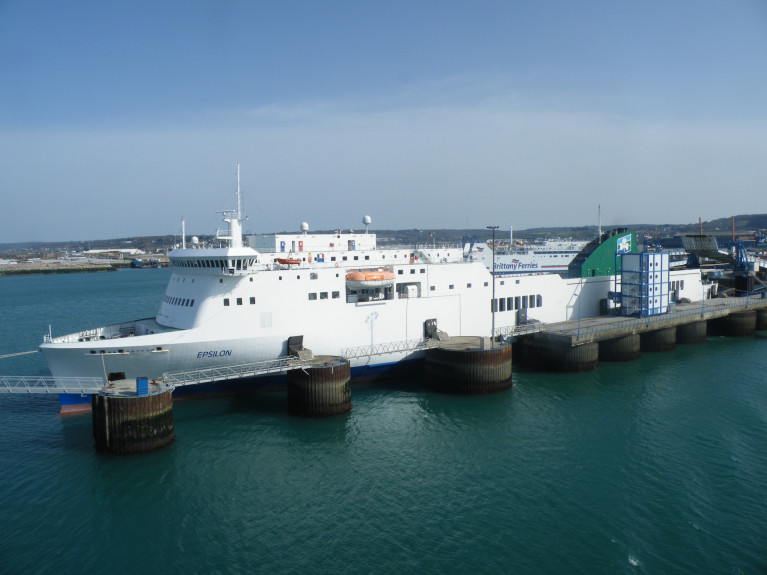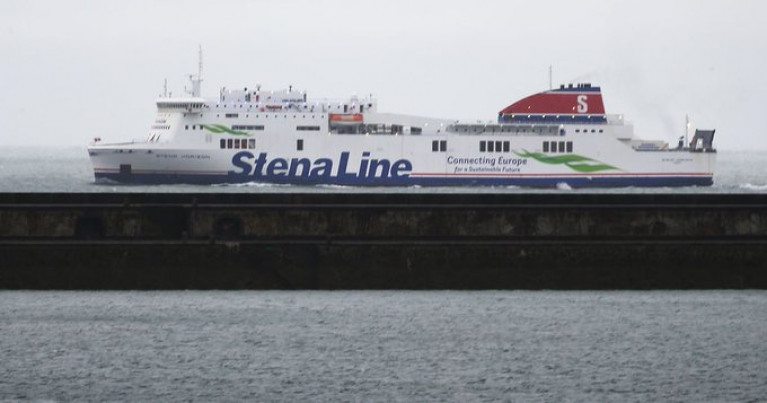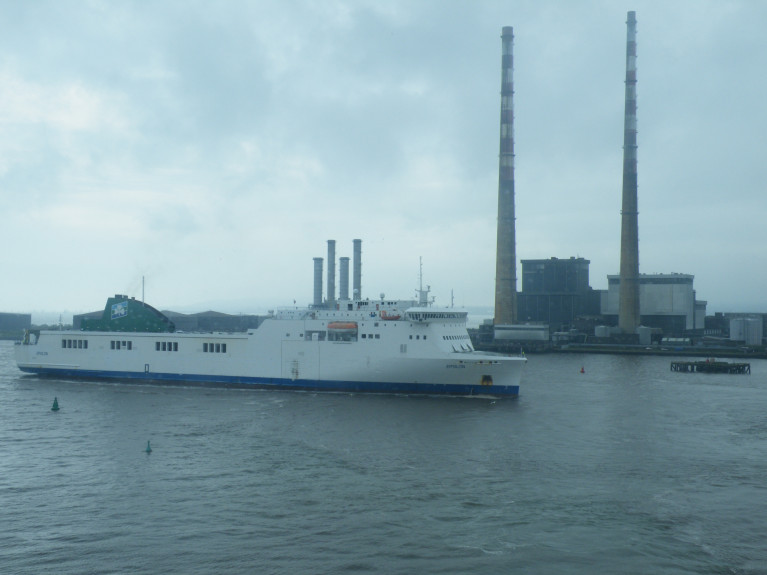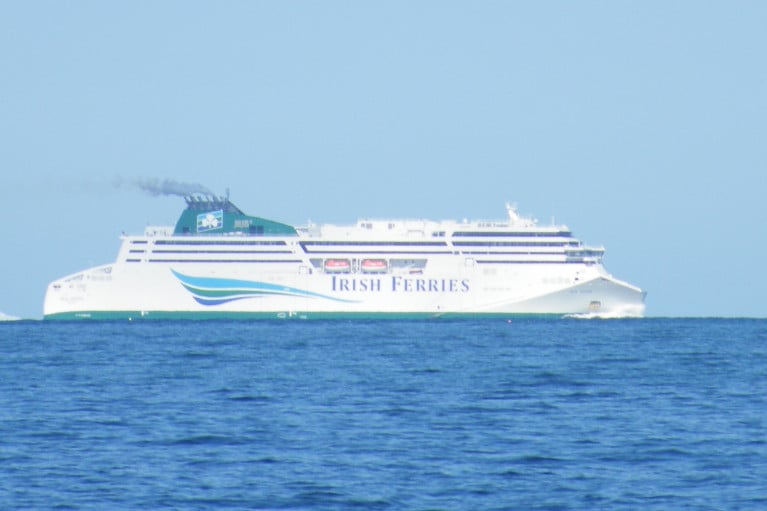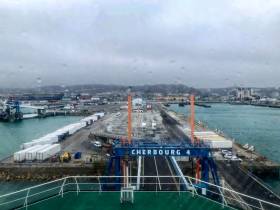Displaying items by tag: DublinCherbourg
Oscar Wilde Soon to Debut on Ireland-France Route of Dublin-Cherbourg
Oscar Wilde, Irish Ferries chartered-in cruiseferry, is to enter the Dublin-Cherbourg route joining W.B. Yeats, with the debut of the second ship to boost capacity in the year the French capital hosts the Olympic Games, writes Jehan Ashmore.
The Paris Games commence in late July, however in the meantime, Irish Ferries have available to book an early summer getaway for travel to France starting from just €299* return for two including a car and cabin. The offer can be snapped up from this weekend and is valid for travel up to 26th May, for up to 7 nights away.
For further terms and conditions of this offer*, visit the operator’s website, which Afloat.ie consulted their sailing schedule which sees Oscar Wilde start service on 16th February with a departure from Dublin to Cherbourg and returning to the Irish capital two days later.
The cruise ferry built in Finland, likewise of Ulysses (fresh from overhaul), will also carry out first Dublin-Holyhead duties in addition to beginning service on the Ireland-France route with weekend sailings supporting W.B. Yeats which operates throughout the year on the Dublin-Cherbourg connection that began in 2014. It was however, P&O Ferries which had first established the direct Ireland-mainland continental route until operations ceased two decades ago.
Features of Oscar Wilde include an à la carte restaurant, a self-service restaurant, a bar, club class lounge, gaming zone and a family-children's play area and also facilities for pets. As for vehicles, there is over 2,380 lane meters for cars, coaches, and freight trucks and an associated drivers' lounge available on the direct route that bypasses the UK, albeit Irish Ferries also have an alternative Dover-Calais link which forms part of the UK land-bridge with their Irish Sea routes including Rosslare-Pembroke.
Last year Oscar Wilde made its maiden entry for Irish Ferries, on the southern Ireland-Wales route having been chartered to parent company, Irish Continental Group (ICG) from the Tallink Grupp. The Tallinn based operator's purpose built Star, originally served on the popular ‘Shuttle’ service connecting the Estonian capital and Helsinki, Finland. As the then to be renamed Oscar Wilde, Irish Ferries announced would 'initially' operate the Irish Sea route of Rosslare-Pembroke for the busy summer period having replaced Blue Star 1.
Currently, the 114 passenger ropax Norbay is time-chartered to Irish Ferries as P&O Ferries confirmed to Afloat, with the ferry on the Rosslare-Pembroke route taken over Oscar Wilde which at the end of last month went to Larne for a scheduled lay-over period and maintenance including a paint spruce up in preparation for its forthcoming French debut.
Also at the Co. Antrim ferryport, Afloat tracked Arrow, where the Isle of Man Steam Packet's relief freighter occupies a berth when not in service as second spare ship Ben-My-Chree is berthed in Douglas.
With Oscar Wilde set to sail next Friday on the Ireland-France route, Irish Ferries for the first time will be able to offer passengers with a more balanced level of enhanced service, given the facilities from two cruise-ferries, as the newcomer replaced the near decade long chartered ropax Epsilon on the route. The freight-orientated vessel had limited passenger facilities when also serving on the Dublin-Holyhead route.
Taking 2,080 passengers with 131 cabins providing berths for 520 passengers, Oscar Wilde will now be better utilised on the longer Ireland-France overnight passage where the cruiseferry will also have at it disposal if required an impressive speed of 27.5 knots.
There was a previous Oscar Wilde, which also connected Cherbourg albeit with the Irish port for France then based out of Rosslare. After the delayed delivery of newbuild W.B. Yeats in 2019, the 'Oscar' was sold by the operator which also abandoned the Wexford port's routes with France in favour of using Dublin instead given the direct link with the capital as highlighted in the press was deemed by maritime sources to be more profitable.
This winter when W.B. Yeats was dry-docked in H&W Belfast for routine overhaul, Epsilon covered crossings until partnered with the aforementioned Norbay which left P&O using twin ropax Norbank to soldier alone on the Dublin-Liverpool route until its closure in December. It was during this time where adverse weather led to cancellations on the continental route.
Now that the 125 freight trailer unit Norbay is on the Rosslare-Pembroke route and given the vessel's limited passenger facilities, this is reflected on Irish Ferries booking engine which has the ship described as an ‘economy ferry’. The ferry since November, has three months left of a six month charter, though will Irish Ferries extend the option beyond May or seek a more suitable ferry on the southern corridor which deserves to be consistent for customers.
In addition, due to accessibility restrictions, Norbay does not cater for ‘foot’ passengers, as was the case when running on P&O’s Dublin-Liverpool link, noting Norbank is to continue serving its owner next month by opening a new Tilbury (London)–Rotterdam freight-only route.
International Fast and Secure Trade Lane Project to Bring Closer Digital Links Between Dublin Port & Cherbourg
The overall Motorways of the Sea (MoS) framework, that involve ports and maritime links across the Atlantic Arc, in particular Ireland and north-west France (Dublin Port-Cherbourg), have an increasingly important role in keeping Ireland connected to the single market.
It is essential to support the overall connectivity between Ireland and continental Europe, providing ports, shipping lines and logistic chain actors with a set of effective tools to overcome inefficiency, drive competitiveness and reduce costs.
In this framework, our overarching aim is the implementation of the 'International Fast and Secure Trade Lane' (IFSTL) approach, a trade facilitation initiative in the form of a set of harmonised and interoperable tools (business process modelling, software solutions, operational guidelines and governance models) on Motorways of the Sea routes. These MoS routes connect Ireland with France, the UK and other European countries.
Under the guidance of our chosen consultants, Circle SpA, phases 1 and 2 have been completed and the project in now moving into the third phase, in which digital solutions will be tested and validated by our project partners, Dublin Port and the Port of Cherbourg.
Progress
The IFSTL project has five distinct phases that involve:
1. The articulation of the AS IS scenario
2. The articulation of a desired future scenario
3. The identification of digital solutions
4. The validation of the digital solutions
5. Implementation
For further information Afloat adds on the IFSTL project to improving the Dublin–Cherbourg (MoS) route given the impact of Brexit, click here.
In addition news released from the Irish Maritime Development Office, click here, The IMDO is Ireland’s national dedicated development, promotional and marketing office for the shipping and shipping services sector.
They also publish an annual statistical bulletin, the Irish Maritime Transport Economist in which Afloat reported last month.
Afloat has noted Stena Line's new Dublin-Cherbourg route launched in January, has not been operating on a regular basis by the inaugural 'E-Flexer' class ferry, in particular to sailings last month, writes Jehan Ashmore.
The operator's first route connecting the capital and mainland Europe began operations using the E-Flexer Stena Estrid, redeployed from the Dublin-Holyhead, where traffic so far this year is down due to post-Brexit.
The larger leadship E-Flexer ropax made a debut on the Ireland-Wales route in early 2020, just months before Covid-19 struck and subsequent first Irish lock-down that took place almost a year ago.
Another ropax, Stena Horizon having served this winter as Irish Sea relief ferry to cover overhaul of fleetmates, has recently taken up Dublin-Cherbourg duties, but otherwise normally operates Rosslare-Cherbourg.
But before Stena Horizon's debut on the Dublin-mainland Europe service, Stena Estrid had been running out of Rosslare to France, joining January's introduction of ro-ro freighter Stena Foreteller. This in an effort to boost capacity to meet surging demand from freight hauliers to bypass Brexit.
So why the change of ropax vessel serving the Dublin-Cherbourg route?, this led Afloat to seek a response from Stena Line below.
“Due to trade distortions on the Irish Sea caused by Brexit, Stena Line requires one of its E-Flexer vessels on the Rosslare-Cherbourg route due to the high demand from drivers for cabins on the ‘direct route’ and the other E-Flexers are required to cover similar demands into Belfast".
"The weekend service from Dublin-Cherbourg is covered by the vessel operating on Dublin-Holyhead, which is currently Stena Horizon, part of a more flexible fleet strategy employed by Stena Line where vessels are moved in line with current demand requirements".
Stena also added that "Demand remains strong on Dublin-Cherbourg and Stena Horizon is more than capable of handling the current demand but as always Stena Line will closely monitor traffic flows to ensure its fleet deployment is aligned for optimum efficiency.”
As of this afternoon, Stena Horizon is in Dublin Port prior to running week-day operations to Holyhead. While berthed at Rosslare Europort is Stena Foreteller and at the English Channel port of Cherbourg is where Stena Estrid is berthed.
Irish Ferries Face Competitor By Boosting Freight Capacity With Second Ship on Dublin-Cherbourg Service
Irish Ferries have further responded to demands from hauliers and new competition from Stena by boosting freight capacity with a second ferry added onto the Dublin-Cherbourg service this weekend, writes Jehan Ashmore.
Afloat ascertained this development having observed the chartered ro-pax Epilson (170 freight units) depart Dublin Port on Friday afternoon with an outbound sailing to the mainland European port. It transpires based from the operator's freight website that the sailing took place earlier than scheduled due to the adverse weather conditions on the Irish Sea (see related story).
Further research revealed that Epsilon's sailing schedule on the direct Ireland-France involves a single round trip at the weekends. Whereas, during week-days the ropax resumes routine crossings on the Dublin-Holyhead service in tandem with the cruiseferry Ulysses.
Noting that the ferry sector is a constantly evolving scene given Brexit etc and so further changes in flexibilty of schedules can easily be expected. This can be due to operational reasons and market demand.
As for the present, Epsilon this morning is making its inbound sailing to Dublin Port (due 12.00) from where yesterday evening Afloat also observed the route's other ship, the cruiseferry W.B. Yeats (165 freight units) depart in the reverse direction. Also this morning, this ferry is nearing completion of the crossing to the north France port in Normandy.
The move by Irish Ferries is set against the backdrop of rivals, Stena Line which made a first entry on to the Ireland-France route this month. This new service is operated by Stena Estrid, which likewise of Irish Ferries, makes a single round trip at weekends before returning to weekday based Dublin-Holyhead sailings joining Stena Adventurer.
This is about to change as next week Stena Line is to withdraw Stena Estrid from the Ireland-Wales service and onto the Irish capital-continental route and therefore increase sailings and capacity. In addition, the smaller capacity Stena Horizon is to take 'Estrid's place by transferring to the Dublin-Holyhead route having operated Rosslare-Cherbourg service (see: newcomer Brittany Ferries) also run by ro-ro freighter Stena Foreteller.
As reported earlier this month the transfer of W.B Yeats from Dublin-Holyhead to the Ireland-France route took place more than four months in advance than scheduled. This in response to the rapid surge demanded by hauliers wanting to avoid the UK land-bridge and resultant complications of customs clearance of a post-Brexit UK.
W.B. Yeats at more than 50,000 gross tonnage is the largest ferry operating out of Ireland but due to heavy seas the ferry took a 'weather route' which involved departing Dublin Bay via the Baily Lighthouse and onward to the Kish Lighthouse and further offshore to deeper waters.
Otherwise in more favourable weather, the ferry heads south out of Dublin Bay via the Muglins Lighthouse and along off the east coast sandbanks until around off Wicklow Head. From these waters the course veers further offshore and towards the centre of the St. Georges Channel.
With Stena adding to Irish Ferries services on the Dublin-Cherbourg route, they follow the original pioneer on the direct route first launched by P&O Ferries in 2003 using the ro pax European Ambassador. On occasions subject to freight traffic demands, the ro pax would make en route calls to Rosslare Europort but on the majority of occasions this involved an arrival from France.
In the second year of service, P&O opened the route up to 'foot' passengers which was welcomed and also on a personal basis having taken the inaugural crossing on this direct and convenient connection to the continent.
Irish Ferries Boost Freight Capacity As W.B. Yeats Enters Service Early on Direct France Route
W.B. Yeats, the largest ferry operating out of Dublin Port has switched from the Holyhead route to Dublin-Cherbourg due to the continued surge in freight demand on direct routes to France, writes Jehan Ashmore.
The 165 freight accompanied unit capacity Irish Ferries ship began the Ireland-mainland Europe route last week though the cruise ferry was originally scheduled to enter service but not until 25 May, marking the traditonally busier summer season.
Irish Ferries early redeployment of the larger lorry-driver cabin capacity W.B Yeats on the French route led to the transfer of the chartered ropax Epsilon to return on the Dublin-Holyhead route. The smaller ropax works in tandem with the cruise ferry Ulysses though passenger demand on the Irish Sea is low given this quiet time of the year coupled with Covid-19 restrictions. While rivals, Stena Line recently implemented temporarily a reduction in sailings as Afloat reported due to supply-chain issues.
The swap of vessels between these routes is no surprise given the surge in demand experienced in Rosslare Europort where rivals Stena Line prior to the festive season stepped up capacity also to Cherbourg that was due to begin last Monday.
In addition the launch by DFDS new Rosslare route to Dunkirk on 2nd January is another indicator of such freight demand. The level in haulage capacity is to increase yet further when Brittany Ferries in March will also connect the Wexford ferryport and Cherbourg.
The Normandy port is not only proving a convenient and strategic port for Irish haulage firms and other customers using three ferry operators, as Brittany Ferries recently reintroduced the freight-only ferry Cotentin but serving the UK.
After an absence of 7 years for the French operator, Cotentin's Stena Line Baltic Sea service ceased late last year with the freighter returning to English Channel service sailing on New Year's Day on the Cherbourg-Poole route.
Cotentin is back due to the UK Department for Transport's contract for extra freight capacity on routes to France following Brexit and the consequent termination of the free trade agreement with the EU.
In April, Barfleur the route's routine ferry resumes service and will offer passenger capacity too.
#ferries - Its been a momentous week for W.B. Yeats as the new €144m cruiseferry won prestigious international shipping awards ahead of completing a first round trip voyage to France having arrived back in Dublin Port this morning, writes Jehan Ashmore.
The operator of the 1,800 passenger, 300 car and 165 truck capacity cruiseferry, Irish Ferries choose the return leg, Cherbourg to Dublin to be the 'official' maiden voyage so to enable marking the start of the St. Patrick's Day weekend in France. To celebrate the occasion, the port in Normandy was lit-up in the emerald green of Ireland, much to the delight of passengers and crew.
In fact the impressive 51,388 gross tonnage W.B. Yeats, the largest ever to serve on any Ireland-France route and the largest custom-built ferry for the operator, had actually carried out its inaugural commercial crossing on the route's outbound sailing. This involved a departure from Dublin on Thursday afternoon and with an arrival yesterday in the French port.
The WB Yeats though first began service for Irish Ferries on the Dublin-Holyhead route in mid-January, but now concentrates by operating between Dublin and Cherbourg. This will see a 20% greater passenger capacity and up to 4 days per week.
Passengers have the luxury of space, free WiFi, a choice of cinema screen movies and shopping, many bars and restaurants on-board in addition to outside decks to take in the views. A notable feature among the ship's green credentials is a 'scrubber' technology to meet the EU Sulphur Directive and so reduce harmful emissions into the environment.
The debut of W.B. Yeats is expected to provide a major boost to trade and tourism between France and Ireland, though it follows a much delayed entry into service due for last summer leading to cancellations. As widely reported last year, W.B. Yeats was beset with delays during construction at the German shipyard of Flensburger Schiffbau-Gesellschaft (FSG), Flensburg. This was due to third party contractors unable to meet FSG's timeframe in keeping to a schedule to deliver the ship on time on the Dublin-France route. See related compensation story, here.
It was at the French port yesterday where the importance of the route for both tourism and trade was highlighted by Herve Morin, President of Ports de Normandie who said, “With bilateral trade between France and Ireland accounting for almost €20 billion and with French people taking over 500,000 trips to Ireland annually, the Cherbourg to Dublin crossing plays an immensely important role in supporting tourism and trade links between both nations. Ports de Normandie is delighted to celebrate the maiden voyage of the W.B. Yeats from Cherbourg, knowing that it will further strengthen the long and enduring ties of friendship, family, and culture between France and Ireland.”
This afternoon W.B. Yeats is scheduled to depart Dublin on its second sailing outbound to mainland continental Europe, though Irish Ferries have still yet to confirm whether they are to resume seasonal services out of Rosslare Europort to France. As Afloat previously reported in December Irish Ferries announced that they are unlikely to operate a service between Rosslare and France in 2019 and the operator added they would continue to keep this situation under review.
The uncertainty over the Rosslare based routes to Cherbourg and Roscoff, Brittany, is set against the backdrop of the forthcoming Easter Bank Holiday. In addition the implications of tourism and trade in the south-east region given the potential impacts of whatever Brexit scenario arises.



























